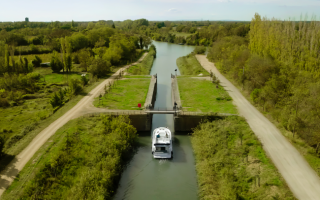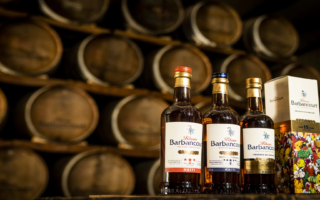Vineyard visits
On holiday in the northern Rh�ne valley, Dominic Rippon found a recipe for the perfect work-life balance
My resolve was steadfast as we lazily followed the river south through the vines, as it divided the large appellation of Saint-Joseph to the west from Crozes-Hermitage to the east. We had reserved a table at L’Auberge de Crussol, a small rustic restaurant perched among the vines above the nearby town of Saint-P�ray. We got as far as the village of Cornas just a few kilometres away before my will faltered. I had seen the sign for Domaine Clape. Perhaps we had time for a quick d�gustation before lunch?
Despite the roadside indications, the likely-looking building bore no advertisement. I rang the bell and waited. A bearded man in tinted glasses emerged. “Domaine Clape?” I enquired. “Pierre Clape, enchant�,” the vigneron replied.
We crossed the threshold and stepped back in time, into a winery that has changed little since Pierre’s father Auguste made his first vintage in 1949. Enormous 1,200-litre barrels, called foudres, were piled up against the walls, each bearing a simple chalk scrawl to indicate the product of a single vineyard parcel within.
It was not entirely by chance that we had passed near the estate. Domaine Clape is considered by many to be the standard-bearer for the often-overlooked 90-hectare Cornas appellation. The name Cornas derives from the Gallic for scorched earth, an echo of its more famous neighbour C�te-R�tie to the north, where the dark-skinned syrah grape is also planted.
Pierre’s son Olivier joined us in the cellar and caught me admiring the ancient barrels. “My grandfather began by using smaller barriques, like most of the region’s winemakers,” Olivier explained. “Then about 30 years ago, he bought two reconditioned foudres, made in Alsace, and was quickly convinced that they made better, more traditional wines.”
Auguste Clape gradually replaced all of his newer barriques with second-hand foudres, which allowed the wine to mature more slowly. Nowadays the Clapes buy brand new foudres, then lend them to the famous Provence estate of Domaines Ott for the first year, so that by the time the barrels receive their first vintage of Cornas, they no longer mark the wine with too much oaky character.
Pierre sank a pipette into a barrel of young Cornas and poured samples. The wine was dark, brooding and embryonic. I glanced at my wife and recognised the look of bemusement. This was her first barrel tasting and, even for an experienced taster, the tough, unyielding Cornas was a challenge. Pierre must have noticed too, because he plunged the glass tube into another barrel, of Cornas ‘Renaissance’, a blend that can be appreciated more easily in its youth. Sounds of appreciation followed, as aromas of dark chocolate, plums and tanned leather leapt from our glasses.
“Cornas is a wine to wait for,” Pierre reminded us. “The foudres allow a slower process of oxygenation than smaller barriques, which makes for longer, more refined ageing. We created the more supple ‘Renaissance’ blend to sell to local restaurants while our more powerful ‘estate wine’ matures.”
I remembered our lunch appointment and was ready to bid the Clapes au revoir when Pierre produced a bottle labelled ‘Saint-P�ray’, a white wine made from a tiny quarter-hectare parcel of vines in the neighbouring village. At only 75 hectares, the Saint-P�ray appellation is even smaller than Cornas, and is exclusively for white wine; most of its vineyards are planted with the exotic marsanne grape, while the zesty roussanne adds freshness and finesse. Two-thirds of Saint-P�ray is still wine and the remainder is made to sparkle by the m�thode traditionnelle.
Pierre filled our glasses and we sipped our ap�ritifs. My wife beamed enthusiastically at the ripe, expressive flavours of apricot and quince, seasoned with a little spice on the finish. A few minutes later, we shook the vigneron’s hand, clambered out of the cellar and before anyone could say “summer in a glass!” the ‘hard work’ was over and we were back on holiday again.
Domaine Clape 146 Avenue du Colonel Rousset, 07130 Cornas Tel: (Fr) 4 75 44 33 64
Share to: Facebook Twitter LinkedIn Email


